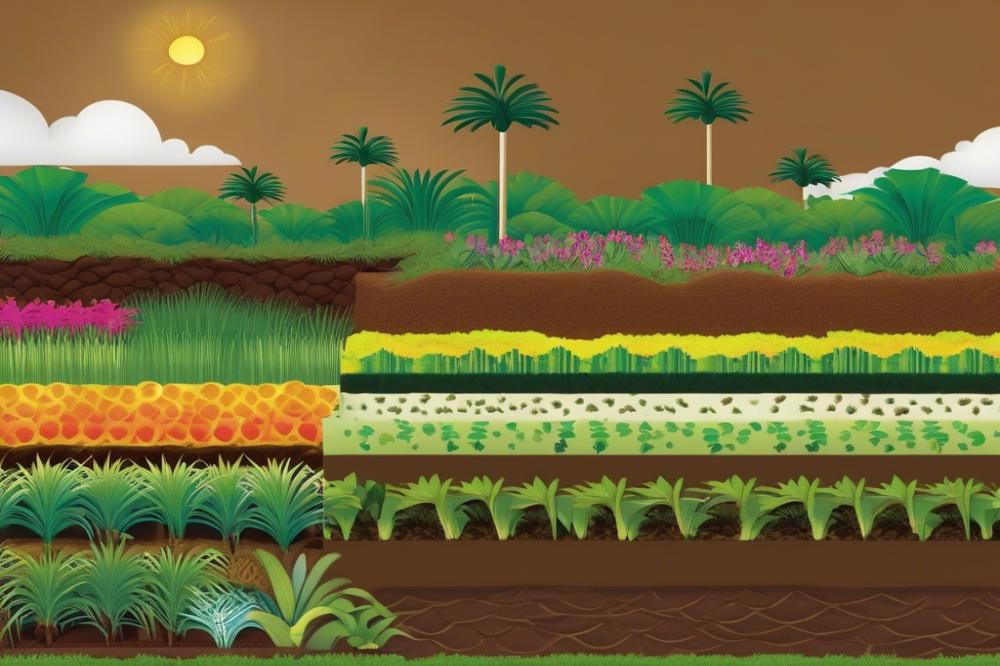Introduction
Tropical gardening offers a vibrant way to connect with nature. The diverse climatic conditions found in tropical regions create a rich environment for various plants. Understanding how to cultivate these plants involves more than just water and sunlight. Key to this process is the often-overlooked element: soil.
Soil plays a critical role in the health of tropical plants. It serves as a reservoir for essential soil nutrients, affecting growth and development. Factors such as soil pH and organic matter greatly influence plant vitality. Proper drainage is necessary to prevent waterlogged roots, which can lead to decay. Meanwhile, soil fertility enables plants to access nutrients effectively, supporting robust growth.
Another important aspect is the microbial activity within the soil. These microorganisms help break down organic matter, enriching the soil and improving its structure. A healthy soil structure fosters strong plant growth, encouraging deep roots that can withstand the elements. Therefore, gardeners must look beyond simply planting and consider the soil properties that impact their plants.
This article aims to explore the fundamentals of tropical soil science. We will discuss ways to improve soil fertility and enhance drainage while promoting eco-friendly practices. Understanding these elements empowers gardeners to create thriving environments for their tropical plants. By grasping the science behind the soil, anyone can cultivate a flourishing garden.
tropical soil science


Tropical soil science studies the soils found in tropical regions. These areas are known for warm temperatures and high rainfall. Understanding this type of soil is vital for growing tropical plants. The properties of these soils directly affect agricultural practices and the health of the environment.
soil properties Unique to Tropical Climates
One notable characteristic of tropical soils is their high weathering rate. This leads to the leaching of soil nutrients, which are essential for plant growth. Soil pH is often lower, making it more acidic compared to soils in temperate regions. Organic matter is another key factor; it tends to decompose quickly in warm, wet conditions. This rapid decomposition can limit the amount of organic material available for future crops.
Influence of Climate on Soil Development
Climate significantly influences how soil develops in tropical regions. High rainfall can create issues with drainage. Poor drainage can result in waterlogged soils, which are not favorable for all plants. Furthermore, the constant warmth encourages microbial activity, which helps break down organic matter. However, excessive moisture can lead to the loss of important soil nutrients from the system.
Plant growth often suffers if soil fertility isn’t managed correctly. In tropical climates, maintaining healthy soil structure is essential for sustainable agriculture. Farmers can adopt eco-friendly practices to help enhance soil nutrients and support the growth of diverse tropical plants. By improving soil health, they can promote a balanced ecosystem that benefits all living organisms.
Soil Nutrients and Tropical Plants


In the world of tropical plants, soil nutrients play a key role in determining health and productivity. Essential nutrients for plant growth come in two main categories: macronutrients and micronutrients. Macronutrients include nitrogen, phosphorus, and potassium, all of which are vital for various functions. Without these, plants struggle to grow and often show signs of deficiency.
Micronutrients, although required in smaller amounts, are equally important. These include elements like iron, manganese, and zinc. They assist in many processes, such as photosynthesis and enzyme function. When any nutrient is lacking, a tropical plant may exhibit stunted growth, poor fruiting, or discoloration.
Role of Macronutrients and Micronutrients
Each nutrient has a specific role in plant development. Nitrogen is crucial for leafy growth and overall vigor. Forests especially benefit from good nitrogen levels in the soil. A balance of phosphorus enhances root development and flowering. Potassium improves stress tolerance and strengthens plant structure.
Micronutrients can be just as influential. For instance, iron aids in chlorophyll production, which is vital for photosynthesis. Manganese helps in the formation of certain enzymes. Together, macronutrients and micronutrients build healthy and robust plants.
Impact of Soil Fertility on Plant Health and Productivity
Soil fertility directly impacts tropical plant growth. Fertile soils teeming with organic matter provide a nurturing environment. Organic matter not only supplies nutrients but also improves soil structure and drainage. Healthy soil structure is essential. It allows air and water to reach roots, promoting optimal plant health.
Furthermore, microbial activity thrives in hospitable soils. Microbes break down organic materials, releasing nutrients back into the soil. This process supports the nutrient cycle crucial for sustaining plant life. Dense or compacted soils can hinder these benefits, causing isolation of roots from necessary resources.
Regular testing of soil pH is essential for maintaining fertility. Certain plants prefer specific pH ranges for optimal nutrient uptake. This aspect is often overlooked in gardening but can significantly affect growth rates and yield. Eco-friendly practices, such as crop rotation and organic amendments, can enhance soil health. Such practices ensure that interrelated aspects of soil management are in harmony.
In summary, a thorough understanding of soil nutrients and their importance allows for improved management of tropical plants. Healthy soils lead to thriving ecosystems and bountiful harvests. Balancing nutrients, pH, and organic matter sets a solid foundation for the lush growth of tropical flora.
Soil pH and Its Effects on Plant Growth


Understanding soil pH in tropical regions
Soil pH measures how acidic or alkaline the soil is. This factor plays a significant role in the growth of tropical plants. Most tropical soils tend to be more acidic. The weather, along with organic matter decomposition, influences pH levels. In these environments, proper analysis of soil pH becomes essential for gardeners. Knowing the pH level can help identify nutrient availability. Some nutrients thrive in acidic soil, while others do better in neutral or alkaline conditions.
Optimal pH ranges for various tropical plants
Different plants have unique pH preferences for their growth. Some tropical species prefer a slightly acidic range of 5.5 to 6.5. Others may require a pH closer to neutral, around 6.5 to 7.5, for excellent growth. For instance, vegetables like tomatoes and peppers thrive in a mildly acidic soil. Orchids, on the other hand, enjoy a more acidic environment. This difference shows that specific plants have adapted to various soil conditions. Understanding these preferences can guide better planting decisions.
Adjusting soil pH to enhance nutrient availability
When soil pH falls outside the optimal range, plant growth can suffer. If the soil is too acidic, nutrients like phosphorus can become locked, making them unavailable. Adding lime to overly acidic soil can help raise pH levels. This adjustment encourages healthier microbial activity and improves soil fertility. Conversely, if the soil is too alkaline, sulfur can be added to lower pH. These eco-friendly practices enhance drainage and support better soil structure. By managing soil pH, gardeners can foster the growth of robust tropical plants.
Organic Matter and Soil Structure


Importance of Organic Matter in Tropical Soils
Organic matter plays a crucial role in the health of tropical soils. It is formed from the decomposition of plant and animal materials. In regions with dense vegetation, this material accumulates rapidly. Due to the warm climate and high humidity, decomposition happens faster than in temperate zones. Consequently, organic matter is abundant and supports various ecosystems. It improves water retention, which is vital for plant growth. Additionally, organic matter enhances soil pH balance. This balance can prevent nutrient deficiencies in tropical plants.
How Organic Matter Influences Soil Fertility and Microbial Activity
The presence of organic matter increases soil fertility significantly. Nutrients become more available for plants through a complex process of transformation. For example, nitrogen from organic matter is converted into forms that plants can absorb. Enhanced microbial activity is another essential aspect. Beneficial microorganisms break down organic materials, releasing vital nutrients. These microbes also improve nutrient cycling, fostering a rich environment for plant roots. They help maintain a healthy ecosystem beneath the surface. Overall, a thriving microbial community boosts soil health, benefiting all tropical plant varieties.
Building and Maintaining Healthy Soil Structure
Healthy soil structure is vital for effective drainage and nutrient absorption. Organic matter contributes to forming stable aggregates. These clusters create spaces within the soil, allowing air and water movement. Moreover, a good structure prevents erosion and compaction. Farmers can enhance soil structure through eco-friendly practices. Crop rotation and cover cropping are useful techniques. These methods add organic matter over time and improve soil quality. Maintaining soil structure leads to better outcomes for both soil fertility and plant health. Ultimately, understanding these interactions is essential for sustainable agriculture in tropical regions.
Drainage and Water Management
Significance of Drainage in Tropical Gardening
Proper drainage plays a crucial role in tropical gardening. Tropical plants thrive in humid environments, but excessive water can harm them. Roots sitting in saturated soil can lead to root rot, stunting growth. Well-drained soil helps prevent waterlogging, allowing roots to access needed air. This balance supports healthy microbial activity which boosts soil nutrients. Additionally, plants in dryer conditions tend to be more resilient. They develop stronger root systems, enhancing their ability to absorb essential minerals.
Techniques for Managing Soil Moisture
Several techniques can aid in effective water management. Adding organic matter, like compost, improves soil structure and enhances drainage. This incorporation encourages the soil to retain moisture without becoming too compact. Raised beds are another option, elevating plant roots above water levels during heavy rain. Mulching is useful as well. It minimizes evaporation and helps maintain a steady soil temperature. Use of drip irrigation can be effective for consistent moisture without oversaturation.
Impact of Drainage on Root Health and Plant Growth
Good drainage positively affects root health. Healthy roots facilitate nutrient uptake, directly influencing plant growth. If drainage is poor, roots may struggle, leading to weak growth and reduced yields. Soil pH also becomes unstable when water pools, creating unfavorable conditions. Regular maintenance of drainage systems can help in supporting overall soil fertility. Eventually, optimally drained soil fosters an environment where plants can flourish. Implementing eco-friendly practices further aids in sustaining a vibrant garden ecosystem.
Microbial Activity in Soil
Microorganisms play a vital role in the health of soil, especially for tropical plants. They help in nutrient cycling, making essential soil nutrients available to plants. Without these tiny organisms, many nutrients would remain locked away in the soil. Bacteria, fungi, and other microbes break down organic matter, releasing nutrients such as nitrogen, phosphorus, and potassium. This natural process enriches the soil and supports plant growth.
Role of Microorganisms in Nutrient Cycling
Microbial activity is fundamental to maintaining soil fertility. Decomposers, including specific bacteria and fungi, transform dead plant material into nutrient-rich organic matter. As they digest organic compounds, they also produce humus, an important part of healthy soil structure. This humus improves soil pH and enhances drainage, making it easier for tropical plants to thrive. Additionally, some microbes form symbiotic relationships with plant roots, further aiding in nutrient uptake. Such interactions maximize the benefits that plants receive from their environment.
Beneficial Bacteria and Fungi for Tropical Soils
Beneficial bacteria and fungi specifically adapted to tropical soils contribute significantly to soil health. Mycorrhizal fungi, for instance, connect plant roots with a vast network of soil nutrients. This relationship boosts the plant’s access to water and essential minerals. Meanwhile, nitrogen-fixing bacteria convert atmospheric nitrogen into a form that plants can absorb. Tropical plants, which often grow in nutrient-poor conditions, heavily rely on these microbial helpers. Their contributions are crucial for sustaining agricultural practices in vulnerable ecosystems.
Promoting Healthy Microbial Activity Through Eco-Friendly Practices
Encouraging healthy microbial activity can be achieved through eco-friendly practices. Reducing chemical fertilizers minimizes harm to beneficial organisms living in the soil. Instead, organic matter should be added, such as compost or mulch. These practices enrich the soil and support a diverse microbial community. Crop rotation is another beneficial strategy. Varying the types of plants grown in a specific area improves soil structure and reduces pest buildup. Cover crops also enhance soil moisture retention while providing habitat for microorganisms.
Eco-Friendly Practices for Soil Management
Management of soil is crucial for the success of tropical plants. Eco-friendly practices can significantly enhance soil health and promote plant growth. Utilizing methods that boost soil fertility is essential for sustainable gardening.
Conservation Techniques for Tropical gardens
Implementing conservation techniques can prevent soil erosion and maintain its structure. Techniques such as contour planting and terracing are highly effective. These methods help to slow down water runoff and retain more moisture. Maintaining a diverse plant selection can also contribute positively. Diversity supports a robust ecosystem, which in turn enhances microbial activity that is vital for nutrient cycling.
Benefits of Composting and Mulching
Composting is a straightforward way to improve organic matter in the soil. Decomposed materials, like food scraps and yard waste, enrich the soil with nutrients. This process not only helps in recycling waste but also fosters the growth of beneficial microorganisms. Mulching provides a layer that protects the soil surface. It helps regulate soil temperature, retain moisture, and suppress weeds. Both composting and mulching contribute to improved soil pH, aiding in nutrient availability for plants.
Use of Cover Crops and Organic Fertilizers
Cover crops play a crucial role in enhancing soil health. They prevent soil erosion during the off-season and add organic matter when tilled back into the soil. Plants such as legumes fix nitrogen, a necessary nutrient for plant growth. Organic fertilizers, derived from natural sources, boost soil nutrients without harmful chemicals. They enhance soil fertility and contribute to a healthier ecosystem. Using these methods helps cultivate a thriving garden while maintaining eco-friendly practices.
Bringing It All Together
Understanding the science of soil is vital for anyone interested in cultivating tropical plants. Healthy soil is the foundation for vibrant growth. The intricate relationships between different soil types, microorganisms, and plant roots create a dynamic ecosystem. Awareness of how to foster these relationships can significantly impact gardening success.
Maintaining tropical soils requires sustainable practices. These methods help retain essential soil nutrients and promote overall ecological health. Avoiding harmful chemicals is crucial. Instead, focus on natural fertilizers and composting. Rotating crops can prevent soil depletion and improve fertility over time. In addition, conservation techniques like mulching help minimize erosion and maintain moisture levels.
Gardeners should feel empowered to apply this knowledge. By adopting practices that support the environment, they can cultivate thriving plant life. Engaging with the soil means more than just digging; it involves a commitment to nurturing the ecosystem. Each decision can influence not only the garden’s health but also the broader environment.
In sum, nurturing tropical plants effectively hinges on sound soil management. Embrace sustainable techniques to keep your garden flourishing. With the right approach, you can create a lush, sustainable oasis. Every little action contributes to a better gardening experience and a healthier planet.



